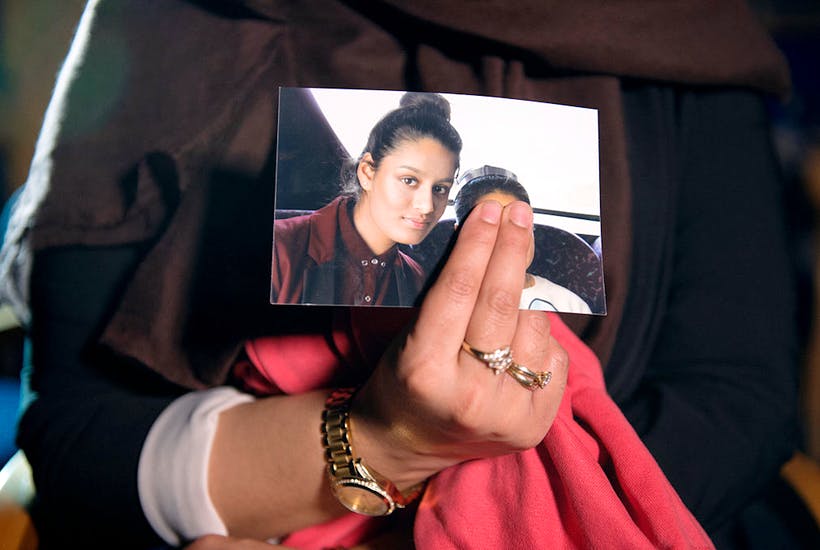What should be done with Shamima Begum? Her husband Yago Riedijk, a Dutch jihadi fighter, has now said he wants to bring Begum home after her British citizenship was revoked. ‘We should live in Holland’, he told the BBC. In the Netherlands, the response has been clear: they are not welcome. The Dutch government takes a similar approach to the British when it comes to the question of dealing with citizens who travelled to Syria. Where a foreign fighter has dual citizenship, their Dutch passport can be taken away. If this isn’t possible, there is little the Dutch are willing to do to rescue their citizens from the limbo of the refugee camps or jails of the territory where Isis once reigned in terror. So Begum’s possible escape route to the Netherlands looks like a non-starter.
There is no doubt that Begum – now the mother to a young baby boy – is in a desperate situation. But this is no time to feel sorry for her. When I travelled to Syria, I met with a Yazidi commander. He told me that one of the biggest challenges he faced now was dealing with the trauma of the victims of Isis. ‘How do we deal with a mother and daughter who have been gang raped side by side?’, he asked. Trying to imagine the horror these victims of Isis endured will make any normal person’s blood boil. So these crimes must be remembered as the true context of any interview with Isis fighters or jihadi wives. They are also the explanation of why, whether rightly or wrongly, western governments don’t want these people back.
The interview with Yago Riedijk, in which he spoke of his desire to come home, was not a first in the Netherlands. He follows in the footsteps of other Dutch Isis fighters who have tried – and failed – to brush up their image with similar media appearances. There is understandably little sympathy with such fighters. Instead, in the Netherlands, the political debate that has been going on for almost two years focuses on the offspring of these people. In some cases, desperate grandparents are trying to get youngsters back. But the Dutch government refuses to help. The self-administration north-east Syria (SANES) and the Syrian democratic forces (SDF) have asked the Dutch to co-operate. But the political appetite in Holland is not there; the two largest governing parties (VVD and CDA) remain opposed. This hardline approach is wrong. After all, why should those born in Islamic State through no choice of their own pay the price for their parents’ foolishness?
While western governments struggle to answer this question, the west’s allies against Isis have made it clear that they don’t have the means to keep children in custody. Nor can they keep fighters in prison indefinitely if there is no help from the western world.
There is however a solution if we properly understand the scale and severity of the crimes committed by Isis in Iraq and Syria. On a visit in 2016 to the (then) recently liberated Syriac-Assyrian Christian towns of Nineveh Plain, my Syriac-Assyrian friends cried seeing their looted and devastated homes. It is hard to imagine how it must feel to walk through empty towns, stand in broken and vandalised churches and witness how Isis looted graves for valuables and gold.
The brutal legacy Isis left behind is still being discovered even now. Two weeks ago, the Syrian Democratic Forces found the decapitated bodies of Yazidi sex slaves near Baghouz, the last Isis bastion. These crimes have few parallels, but in their brutality they echo the murderous intent of those who committed atrocities during the second world war. Is the answer then a modern-day Nuremburg trial? This is what the Kurdish administration in north-east Syria is proposing. Could this solution work? It would certainly help to distinguish between those now trapped through no fault of their own – the children of Isis fighters – and their parents who actively decided to sign up with Isis. It also could get around another problem: it is clear that Russia will block any UN-mandated tribunal against Isis. A Nuremberg tribunal – a legal precedent of an international tribunal on crimes against humanity without an UN mandate – could be a useful model. But Europe must provide support if this is to work; in order to make it possible there needs to be proper facilities, military police, judges and legal support from European nations. This will enable a professional process to prosecute these crimes as what they are: crimes against humanity and genocide.
The self-administration in north and east Syria could provide a suitable venue for such a trial, as it is – at least for now – actually safer and more stable than most of Iraq. So this proposal is viable if the political will is there. A majority in the Dutch Parliament supports it already. Belgium is suggesting this solution too. But it is time for Britain and other countries that are not facing up to the question of what to do with their wayward citizens to throw their weight behind this proposal.
After all, it cannot be right that we put the burden of dealing with our criminal terrorist citizens on those who are their victims. While there might be little appetite to face up to the question of what to do with the jihadists’ children, a tribunal would also helpfully distinguish between those stuck in Syria as a result of their own treachery to their homelands, and those youngsters left in limbo through no fault of their own. Even if Britain and the Netherlands don’t want Begum or Riedijk back, why should their baby pay the price for his mum and dad’s foolishness?






Comments